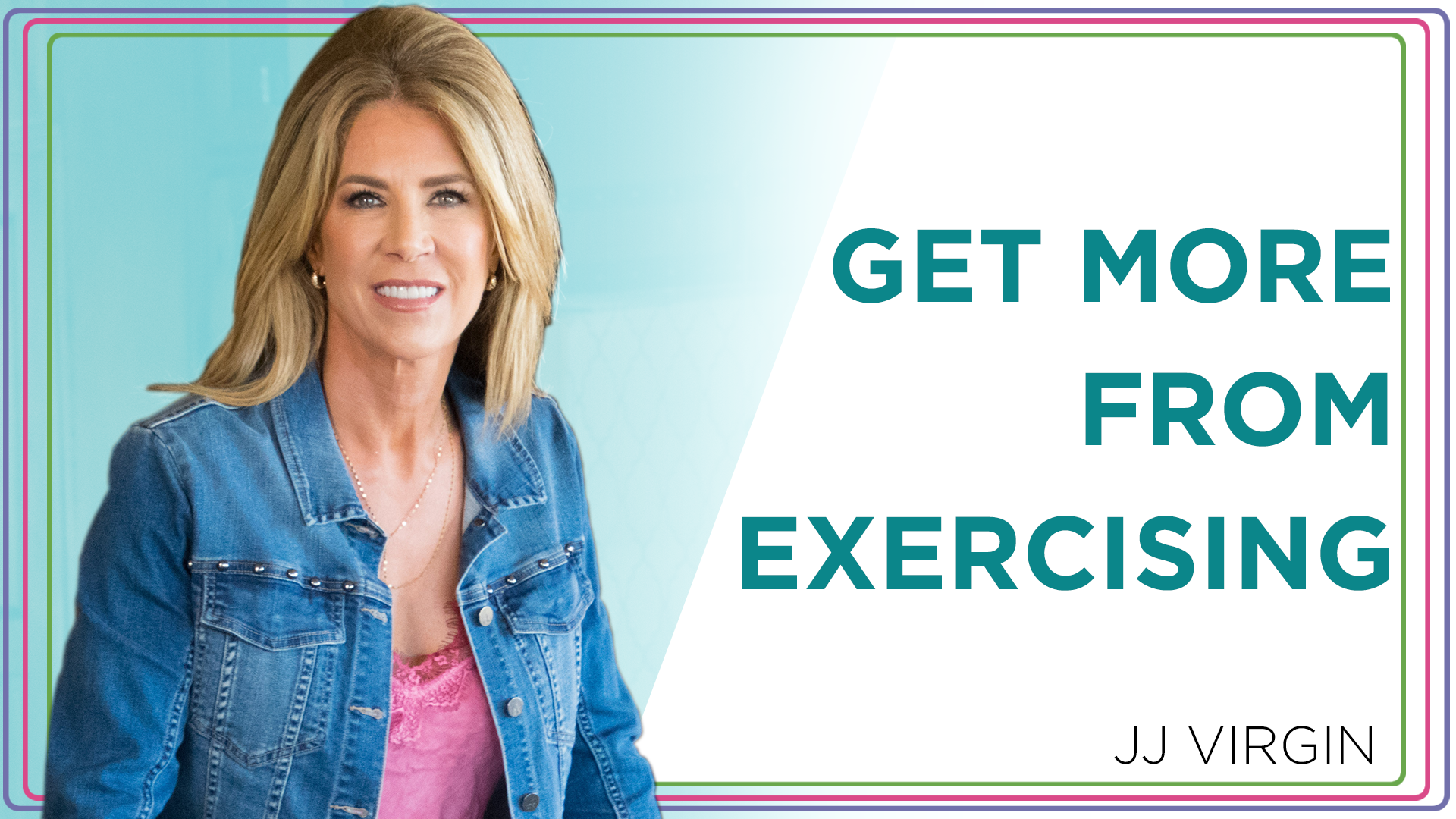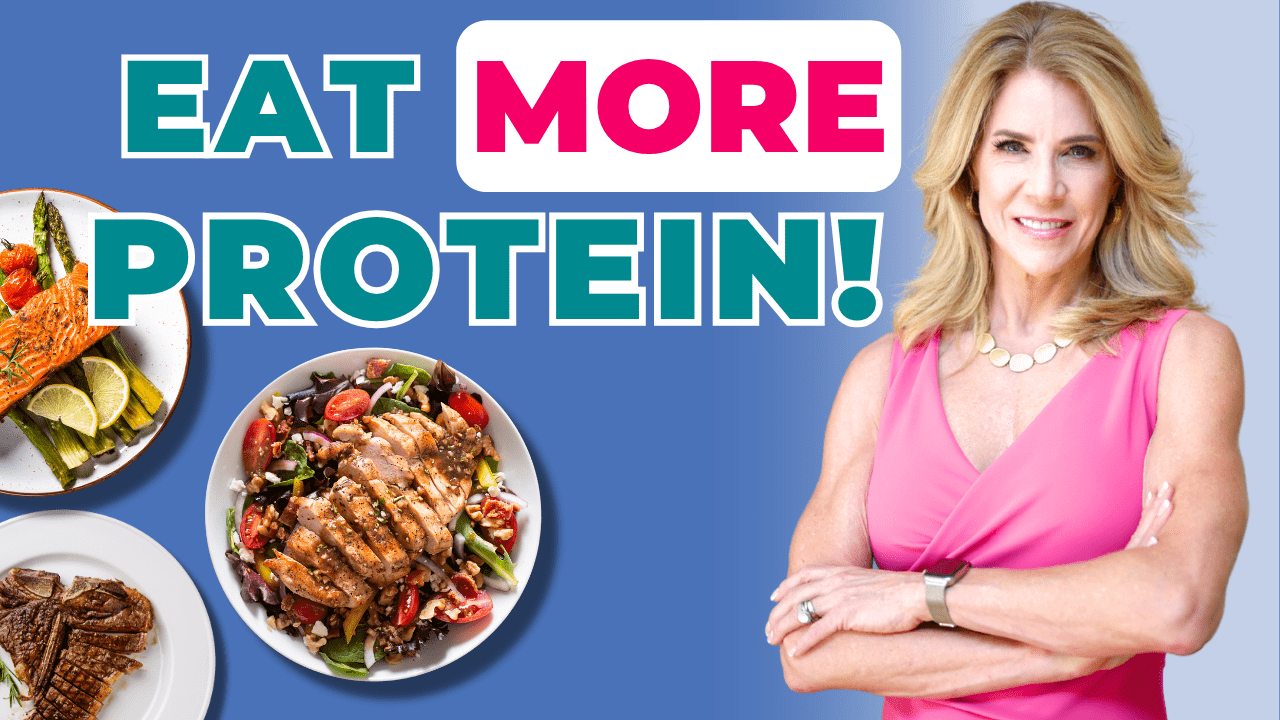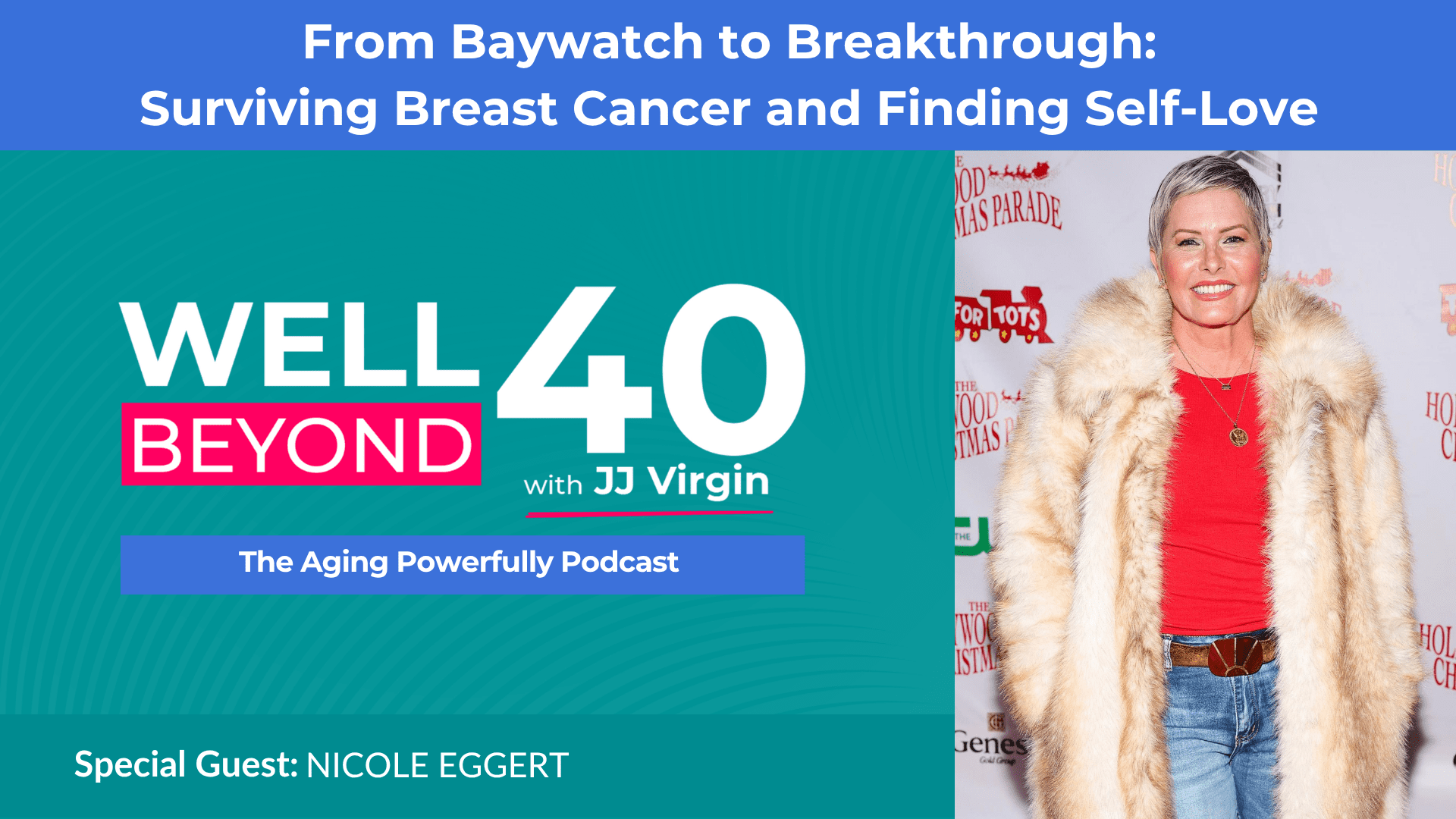Make Your Workout Routine More Effective to Lose Weight & Feel Better Make Your Workout Routine More Effective to Lose Weight & Feel Better
Increasing the impact of exercise can help you lose weight, feel better, and get great results faster. Here, I share with you my most effective strategies to make your workout more effective. You’ll learn why exercise timing matters (and the best time to do it), the secret to boost your morning workout (this is so simple and effective), and how to burn more calories through everyday movement, Plus, you’ll learn the best type of workout (this literally takes minutes to do!), why overdoing cardio can create more harm than good, and the after-workout mistake that can block fat burning. Whether you’ve maintained a fitness routine for years or are just getting started with an exercise routine, you won’t want to miss this actionable, empowering information.
Mentioned in this episode:
Watch the FULL VIDEO on JJ’s Youtube Channel
Got 8 Minutes? How to Build a Quick Fat-Burning Workout
What Should I Eat Before & After My Workout?
Make This Post-Workout Recovery Shake
Click here for more information and offers from our sponsors
ATHE_Transcript_Ep 435_YT 21
JJ Virgin: [00:00:00] Hey, this is JJ Virgin. Thanks so much for joining me. This is ask the health expert. In each episode, I put the power of health in your hands and share ways to get healthy, lose weight, heal your gut detox and lots more. So you can look and feel better fast if you’d rather watch the video. Hey, I did put on my makeup and do my hair.
So check it out on my YouTube channel.
if you’re going to exercise and I hope you do, you should exercise smarter, not harder. There are things you can do to increase the impact of exercise. And some may even encourage you to exercise more often. This channel is all about helping you have better health and feel better. And if you lose weight as a bonus, I hope you’ll be okay with [00:01:00] that too.
So to make sure you keep getting contact like this from me, like, and subscribe to this channel. All right. Let’s talk about how to increase the impact of the exercise you do, because that’s what everyone wants. Right? I mean, if you’re already putting in the work, wouldn’t it be great. If there were a few other simple things you could do to make it even more effective for you now, of course you do them, right.
We’re going to get into when you exercise, what you do to exercise and what, and when you should eat to support exercise and how they can make all of the difference in your overall fitness and weight loss. So let’s talk first about the timing of exercise. Now, I’m always really curious about whether when you exercise matters and let me say right up front that for me, when people ask me, when should I exercise?
I always say. When you will right past that, there’s not a ton of [00:02:00] conclusive evidence about the best time of the day to exercise, but there is some research out there. And I also will tell you my own experience. I can find that the timing of exercise can really shift things. I think just like with eating.
Exercise timing matters. And I’m not the only one who thinks this way. So let me share a few of the things about it, and then you can decide, okay. So most early research and anecdotal evidence says that you exercise more consistently and a little longer when you exercise in the morning. Now think about it.
It’s probably because. If you make that your morning habit, it’s less likely to get bumped when you get so crazy. I know this happens to me. I’ll plan to exercise later in the day, then all these things come up and guess what doesn’t happen. So to plan for the unexpected, you just need to get that workout in done behind you right now.
Second, as you know, working out is also great for your energy [00:03:00] and your mood. So it’s great to have those things boosted when you start the day and third, there’s also this idea that when you work out in the early morning, you’re going to shift to going to bed a little earlier and get better sleep. So that would definitely be a bonus and definitely worth a try.
I know it’s true for me. I mean, it’s an of one, but it definitely works. So if you do decide to work out early, or if you’re already working out early, here’s how to turbo boost the benefits. You’re getting workout, fasted workout. When you wake up and before you eat now, if you can get up in the morning and do some kind of training, even 15 to 20 minutes before you eat anything.
You’ll be able to deplete your glycogen stores faster, which means you burn more fat and really depleting those glycogen stores also means that when you refuel the carbs, you eat, go into your muscles to be stored as energy rather than to your fat cells to be stored as fat. And that is what we all want.
All right. [00:04:00] So what about the timing of exercise during the day? Again, I’m going to say whenever exercise is best for you whenever you will. That’s the best time to exercise, but research is showing even if you don’t get a workout in, you can benefit from just moving more throughout the day. Standing more than sitting fidgeting, walking outside or on a treadmill while you’re on the phone.
However, you can incorporate more movement. It activates something called neat, neat stands for non exercise activity, thermogenesis. And it’s the energy you burn doing everything except exercise or sports, and it can make a big, big difference in the calories you burn over the course of a day. And maybe even a difference in how long you live and how healthy you are in old age.
So people who live in places called blue zones are living longer than most people on the planet. And researchers believe that. Is a big reason [00:05:00] why? Because it’s such an important part of their lifestyle. So you may want to learn a little bit more about that to do that. You can check out my video on the surprising habit, helping people live long, healthy lives.
I think you’re going to find it pretty interesting. And it’s got some ideas for you about how to burn more calories every day. Just by activating neat, just by slipping it on in. Alright then timing at the end of the day matters too. Okay. It doesn’t have to be a CrossFit workout, but it would be great if you can move after you eat dinner.
In fact, I don’t want you to do CrossFit workout after dinner and actually. That’s true, no matter when you eat, because moving after you eat helps lower the blood sugar response to your meal. So if you get moving after every meal, that would be amazing. But if you can only get in some activity after one meal, then a brisk 10 to 20 minute walk after your last meal of the day is the best choice.
Because again, think about this. You’re going to get [00:06:00] that blood sugar lowered insulin lower than you’re going to go off to sleep where you rest and restore and use fat for fuel. Bonus. All right. Let’s talk about the exercise itself now and what’s the best to do. And there’s a couple of different things I’m going to have you do number one resistance training.
Now I know most people think cardio is the best for health and weight loss, but focusing only on moderate intensity, cardio is not going to impact your resting metabolic rate. Yes, it’s going to burn some calories while you’re doing it, but it’s not giving you the big health benefit that you could be getting.
It could actually be working against you. Here’s the deal. When you overdo cardio, it can actually create something called oxidative stress, right? You’re breathing more. It can lower your immune system. It can burn up muscle mass because it’s raising your stress hormone. So you’re catabolic, and if you lower your [00:07:00] muscle mass, you know what you just did.
You lowered your resting metabolic rate. That is not what you want to do. So what you really want to focus on, you want to put your energy into resistance training, which honestly has the opposite effect. Resistance training builds, muscle and muscle. I call muscle your metabolic Spanx. It holds everything in tighter and it boosts your resting metabolic rate.
It also is going to help strengthen your bones and improve your insulin sensitivity. In fact, it’s one of the first places that you can start to improve your insulin sensitivity. And here’s the thing. You’ve heard use it or lose it if you’re over the age of 50 and you’re not doing resistance training, you are losing it and you do not want to become frail.
You want to become stronger as you age, not weaker. And that means you’ve got to be doing resistance training, especially incorporating in some balance. So let’s talk about what you’re going to focus on with your resistance training. I’ve divided the body into four areas. So [00:08:00] there’s upper body pushing that’s things like pushups, overhead presses, dips, there’s upper body pulling.
That would be things like a bent over row or a lap pull down there’s power core. Those are big sit-ups and back exercises and hips and thighs. Things like squats and step-ups. And you’re going to want to work each of these areas at least twice a week. And if you want to build muscle, that’s kind of to keep it.
If you want to build it, make that three times a week now. Here’s what I like to do with that. As I like to hit each body part, at least twice a week, three is better. I give myself a rest break of a day in between. So let’s say I was going to do upper body pushing and pulling on Monday, Wednesday, Friday.
Then I could do hips and thighs and Powercore on Thursday, Friday, Thursday, Tuesday, Thursday, Saturday. So I’ve always got a day break, some rest in between that super-duper important. Then I’m going to make sure that I do at least three to [00:09:00] four exercises for each body part. So upper body pushing, maybe I’m doing.
Pushups and some dips and some overhead presses and there’s three exercises right there. Upper body pulling, maybe at some lat pull downs, upright rows, bent over rows. Then I’m going to make sure I do two to four sets. And a set is as a group of repetition. And I’m going to do multiple sets. So I’m gonna walk you through it as if I was doing pushups, I’m doing pushups.
And by the way, cool thing about pushups. You can do pushups against a wall. You can do pushups on your knees. You can be doing pushups on your toes so you can modify them to any level of your fitness. I want you to work within the eight to 12 repetition range. That’s the best for creating what’s called hypertrophy muscle growth.
Right? If you can’t get to 12. Then you need to, or actually, if you can’t get to eight, you need to lighten the load. If you can keep going past 12, you need to make it heavier. So you’re [00:10:00] working within that range. You do a 62nd break repeat and you want to do two to four sets of an exercise. All right. So there’s the different things you’re going to do there.
And remember you’re going to do this each body part at least twice a week, three is better and you can do all of them. One day, you go to the gym and you could do upper body pushing upper body pulling power, core, and hips and thighs. You could get a TRX machine and do it at home, which is one of the least expensive, coolest things that I’ve found to do workouts.
So there’s a lot of different options, meaning there’s no excuses. Now the other thing I’m going to add into your fitness protocol, it’s called high intensity interval training. Or hit training is probably what you’ve heard. I call it bursting to blast fath. And this is where you do a full body type of movement and movement with all out effort.
Do you remember back in grade school where you were sprinting running, chasing someone or being [00:11:00] chased and your legs were on fire and your lungs were on fire? When was the last time you ever felt like that? This is how you’re supposed to feel with hit training is all out effort and don’t hold anything back.
You’re going to do it for 20 to 60 seconds. The faster you can’t do any more, the better. And then you recover for twice as long. So maybe it’s running up the stairs. Maybe it’s swimming, maybe it’s dancing. Turkish. Get-ups step-ups sprinting. You do it all out for 20 to 60 seconds, then you actively recover for twice as long, and then you repeat it and you want to accumulate four to eight total minutes of bursting.
But as you get stronger, you don’t go longer in the burst. You go harder in the burst. That’s super important and keep doing different things. Just like we teach you to cross train your diet or cross training your exercise here. The benefits of high intensity interval training. Amazing because it helps elevate growth hormone, by the way, [00:12:00] that’s the thing that goes as we age, you want that growth hormone, you’ve got to have that to maintain and build your muscle mass and it helps your body handle stress better.
It’s training your sympathetic nervous system, which is so critical. And here’s the biggest thing that it does. It does all this in very little time because what’s the reason that people don’t exercise. The number one reason people don’t exercise is because they say I don’t have. So I’m going to tell you make time and that extra, that excuse does not fly anymore because now you just saw how you can do this in very short amounts of time.
Like, you know, 12 to 20 minutes, you want to do this three times a week. Three times a week, you’re going to do this. So could be that you do your resistance training one day high intensity interval training the next, all right. Now, next up. And I’m going to put a couple links in my, in, in here so that you’ll get to my favorite hit workouts so you can get a huge explanation.
[00:13:00] That if you feel like you want more and they are just a great way for you to get started. So you’ve got your resistance training, you’ve got your hit training bursting to blast fat. And then I want you to add in some what I call mindful movement. And that’s the thing that’s going to help you tune in with your breathing, with your mind, with your body and help lower your.
Hormones. These are the benefits that can take exercise to the next level and really compliment the intensity of resistance training and high intensity interval training. So this would be things like restorative, yoga, pilates, I go to a really super cool class. That’s yoga and sound healing. It’s going to help you get flexible, work your core length in your muscles, which also can help decrease your risk of injury and help with your flexibility, which again is another thing.
Lose. If you’re not using as you age. And of course this also can help reduce inflammation, boost your immunity and help your mental health. So it’s really the thing that [00:14:00] completes this 360 picture of your overall health and wellbeing. So I want you to do this at least once a week. So one to two times a week.
So you get the frosting on your exercise. All right. Quick disclaimer, for these as with any exercise, you have to determine what mix and intensity is right for you based on where you are in your life. Right now, your fitness. If you’re coming out of an injury or a surgery, what you’re trying to accomplish, here’s an example.
Let’s say that you’re dealing with some adrenal exhaustion. You just went through super stress and you are just really tired. You’re going to probably do better at this point, starting out with the walking, after the meals, I call it moving more, adding in some mindful movement and then start to build in a little bit of hit and resistance training.
But first. You know, go with the easy, go slow and then grow. Okay. Make sense. And then there’s the question of whether you need to eat after you work out and if [00:15:00] so, what should you have? Well, everyone used to think that you had to eat within an hour of working out. It was called the magic window. To get the most out of the workout.
And then that food would go right into those muscles and help your help your muscles grow and help restore the glycogen stores. It turns out that that that’s nearly not as critical as we once thought. Now, if you are an extreme athlete, that’s a whole different story, but for the rest of us, and I’m assuming that’s all of us, you know, it’s not as critical now, if you’re working out fasted, Or if you’re in training, you know, eating at the right time may benefit you.
But again, for most of us, It’s just making sure that you’re getting those right macros in. All right. And that you’re getting in good protein throughout the day. Now let’s say that you’re going to work out in the afternoon and you ate like at noon and you’re working out at. Right. You probably, and then you’re going to have dinner, you’re probably not going to eat right afterwards because you’re already [00:16:00] full.
The big other thing you want to make sure of is that you don’t go eat and then work out. Remember, your body only has so much blood. You want the blood to be able to go to your working muscles so you can work out hard, not into digestion. So ideally you’re giving yourself a couple hours after you ate to work out.
If you need a little something, a little carb hit before you work out, because you feel like just don’t have the energy or strength that’s okay. Keep it small. Should be mainly. Carbs. That would be easy, but you really want to make sure that you are not going in with a full stomach. That is super-duper important now.
You come out of a workout and you’re not hungry right away. Don’t worry about it. Listen to your body. But if you are, you came out of it and you go, okay, I’m hungry. My favorite post-workout thing is a loaded smoothie because you’re giving your body the protein and the healthy carbs. It needs for muscle protein, synthesis, glycogen, refueling, and recovery.
And I really love using. My paleo bone broth protein with branch chain, amino acids, like that hits it out of the [00:17:00] park, what you don’t want to do after you work out is go eat a bunch of fat because it’s going to slow down the absorption of everything. You also don’t want to eat a bunch of fructose can, can actually shut down fat burning after a workout.
You know, we’re not having to eat a bunch of fructose. Anyway, if you’ve been around my camp You know that, but especially after exercise, because again, after exercise, it can block fat burning. And that is definitely not helping you get the most out of a workout. And again, I love using my paleo inspired one, but whether you’re vegan, vegetarian, keto, you can use my all-in-one smoothie.
It’s I’ve got you covered. And it’s so simple and fast. So this is a great one. We come home from the gym, we pull out our neutral bolus and we make our smoothies and away we go. The other thing though, and this is super important is to make sure you’re staying hydrated and you may want to use some electrolytes as well.
Especially if you’re working in a keto style diet, you have a chance to be, or doing intermittent fasting, easier for [00:18:00] you to get dehydrated and. Not only it’s going to impact your workout and your recovery. It also impacts your body’s ability to lose weight and can raise stress hormones. So super important to make sure that you stay super hydrated.
All right, there you go. A few things to help you increase the impact of exercise and get healthier faster. Now don’t forget to move more whenever you can too. Remember that neat that we talked about. So you get the benefits of activity, even when you’re not exercising. So join me next time, where you can take a look at heartburn, why you might have.
More importantly, how you can get rid of it. See you soon.
for more info on this and other health topics I cover or to rate and review, find me on Instagram, Facebook and my website, JJvirgin.com. And don’t forget to subscribe to my show. So you won’t miss a single episode. Go to subscribetojj.com. Thanks again for being with me this week.[00:19:00] .

 Subscribe to our show
Subscribe to our show 





